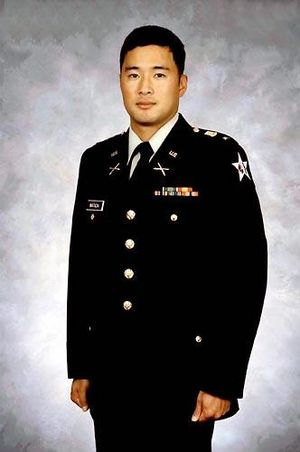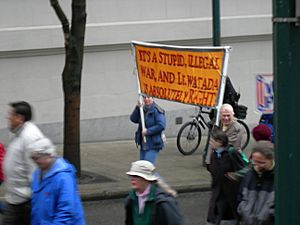Ehren Watada facts for kids
Quick facts for kids
Ehren Watada
|
|
|---|---|

Watada in uniform
|
|
| Birth name | Ehren Keoni Watada |
| Born | 1978 (age 47–48) Honolulu, Hawaii |
| Allegiance | United States of America |
| Service/ |
United States Army |
| Years of service | 2003–2009 |
| Rank | First Lieutenant (1LT) |
| Unit | G-37, HHC, I Corps (Ft. Lewis, WA) |
| Awards | Army Commendation Medal, National Defense Service Medal, Global War on Terrorism Service Medal, Overseas Service Ribbon, Army Service Ribbon |
Ehren Keoni Watada (born 1978) is a former first lieutenant in the United States Army. He became well-known as the first commissioned officer in the U.S. military to refuse to go to Iraq during the Iraq War. In June 2006, Watada said he would not deploy with his unit. He believed the war was against the law. He also felt that being part of it would make him responsible for war crimes.
At that time, he was a fire support officer with the 5th Battalion, 20th Infantry Regiment. This unit was part of the 3rd Brigade, 2nd Infantry Division. The Army later held a court-martial for him in 2007. This trial ended without a clear decision, which is called a mistrial. In 2009, the Army officially let him leave the service. This was under "Other-Than-Honorable-Conditions" (OTH). This type of discharge is given when a soldier's actions are very different from what the Army expects.
Contents
Early Life and Joining the Army
Watada was born in Honolulu, Hawaii. His parents are Robert Watada and Carolyn Ho. His father had also refused to serve in the Vietnam War. Ehren went to Punahou School and then Kalani High School. He played football there. He was also an Eagle Scout. In 2003, he graduated from Hawaii Pacific University with a degree in finance.
Watada joined the Army after the war in Iraq had already started. He said he wanted to "protect our country" after the September 11 attacks. He became a second lieutenant in the field artillery on November 20, 2003. This happened after he finished Officer Candidate School. He served for one year in South Korea. After that, he was sent to Fort Lewis, Washington.
Why He Opposed the Iraq War
Soon after arriving at Fort Lewis, Watada learned his unit would go to Iraq. He started to research Iraq, its culture, and why the U.S. was involved. Watada said that after reading books and articles about Iraq's history and international law, he no longer believed the war was right or legal. He also spoke with veterans who had returned from Iraq.
His Attempt to Leave the Army
In January 2006, Watada tried to resign from the Army. He wrote that he was "wholeheartedly opposed to the continued war in Iraq." He felt the war was illegal and dishonest. He learned this from his own research. This included reading books and learning about the Downing Street Memo. This British document suggested that facts were being changed to support the war.
Watada also told other soldiers that they might be involved in war crimes. He said he was not against all wars. He offered to serve in Afghanistan, which he saw as a clear response to the September 11 attacks. The Army refused this offer. He also turned down a desk job in Iraq. He said his protest was not about avoiding combat. It was about the war itself.
Facing Charges and a Court-Martial
Because Watada refused to deploy, the Army charged him with several offenses. Eventually, three main charges remained:
- Two charges of Conduct Unbecoming an Officer and a Gentleman. These were for things he said in speeches and interviews.
- One charge of Missing Movement. This was for refusing to go to Iraq on June 22.
If found guilty, Watada could have faced up to seven years in prison. He could also have been dismissed from the Army. This is the military's version of a dishonorable discharge for officers. Watada said he did not regret his decision. He felt it was his moral duty. He said he wanted to look back and know he made the right choices.
His lawyer, Eric Seitz, believed the Army added charges to send a message. He thought they wanted to warn other soldiers not to criticize the war.
The Article 32 Hearing
A hearing was held on August 17, 2006. This was to decide if there was enough evidence for a full court-martial. The Army prosecutor said Watada's actions disrespected President George W. Bush. He argued that Watada's public statements hurt morale. He showed videos of Watada telling soldiers to stop fighting.
Watada's lawyers argued that the war was illegal. They brought in experts to testify. University of Illinois professor Francis Boyle said the war was illegal because the U.N. Security Council did not authorize it. He also said Congress approved the war based on bad information. Other witnesses, like former UN Undersecretary Denis Halliday and retired Army Colonel Ann Wright, also said the war was illegal. The American Civil Liberties Union (ACLU) also supported Watada. They said soldiers should not be punished for sharing their views.
The Army later added another charge against Watada. This increased his possible prison time. His lawyer said the Army was trying to make an example of him. The investigating officer recommended a court-martial for all charges.
On November 9, 2006, the Army decided Watada would face a court-martial. Some charges were dropped. This meant he could face up to four years in prison. He could also be dismissed from the Army and lose his pay.
Watada's defense team wanted to argue that the war was illegal. They planned to use the Nuremberg Principles. These principles say soldiers must disobey illegal orders. However, on January 16, 2007, the judge ruled against this. He said the legality of a war was a "political question" and not for the court to decide. He also said Watada could not use a First Amendment defense. Watada's lawyer said they would appeal if he was found guilty.
The Court-Martial Trial
Watada's court-martial began in February 2007. He pleaded not guilty to all charges. He faced one charge for missing movement and two for speaking out against the Bush administration and the war. The trial panel, like a jury, was made up of seven officers. They were all higher in rank than Watada.
On the second day, the prosecution said Watada "abandoned his soldiers." Watada's former commander testified that he was concerned about Watada's public statements. Watada had agreed that he missed his deployment and made public statements. In return, the Army dropped some charges.
Watada argued his orders were unlawful. But the judge ruled that the military court could not decide if the war was legal. The judge then said Watada's agreement was like admitting guilt. Because this agreement was key to the prosecution's case, the judge declared a mistrial. This meant the trial ended without a decision.
Trying Again: Double Jeopardy
The Army wanted to try Watada again. New court-martial dates were set but kept getting delayed. This was because of an appeal about "double jeopardy". Double jeopardy means a person cannot be tried twice for the same crime. Watada's lawyers argued that he could not be tried again after the mistrial.
A U.S. District Court judge agreed with Watada. He said Watada's "double jeopardy claim is meritorious." This meant he believed Watada could not be tried again for some of the charges. The Army appealed this decision. But after the Obama administration took office, the Justice Department asked the court to drop the case. The case was dismissed on May 6, 2009.
His Discharge from the Army
On October 2, 2009, the Army officially discharged Watada. This was "Under Other-Than-Honorable-Conditions." His lawyer believed the Army realized it could not win the case. This type of discharge is the least favorable kind of administrative discharge. It is given for behavior that is a "significant departure" from what the Army expects.
Public Reactions to the Trials
Many people supported Watada. Rallies were held outside Fort Lewis during his court-martial. Over 1,000 supporters attended the first day. This included veterans and actor Sean Penn. Organizations like the ACLU and Veterans for Peace also supported him. Watada said he received support from many people. Amnesty International said if he was imprisoned, they would consider him a "prisoner of conscience."
However, others did not agree with Watada's actions. Some Japanese American veterans felt he shamed their community. Watada said he did not face open hostility from fellow soldiers, but there was "definitely a tension." There were also smaller protests against him.
Watada's mother, Carolyn Ho, became an anti-Iraq War activist. She created a website to support him. His father, Bob, also criticized the war. He went on a national tour to raise money for his son's defense. Ehren Watada spoke at events with other well-known critics of the war. These included Jane Fonda and Sean Penn.
A special "Citizens' hearing" was held in January 2007. People testified about the legality of the U.S. actions in Iraq. This testimony had not been allowed in Watada's court-martial. Speakers included Daniel Ellsberg, who leaked the The Pentagon Papers during the Vietnam War.
After the Military
In 2012, Watada started a restaurant in Las Vegas called Bachi Burger. He became a part-owner of the business.
See also
- Legality of the Iraq War
- List of Iraq War Resisters
- Crime against peace
- Criticism of the Iraq War
- Nuremberg Principles
- Ann Wright (United States Army colonel who publicly submitted her letter of resignation to then Secretary of State Colin Powell on March 19, 2003, one day before the U.S. invasion of Iraq.)
- Doe v. Bush (Appeals court decision on the constitutionality of the Iraq invasion)
- Malcolm Kendall-Smith


